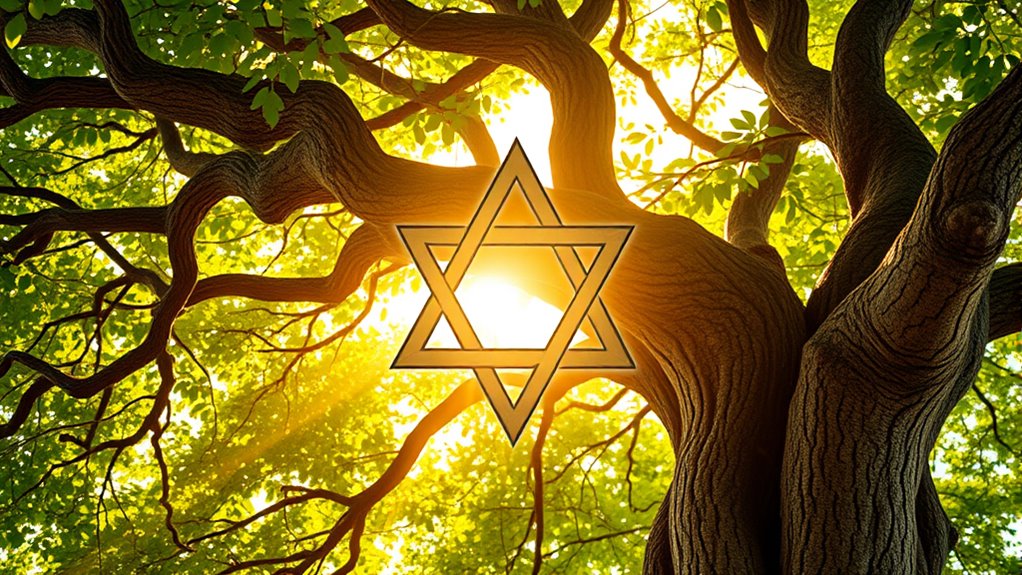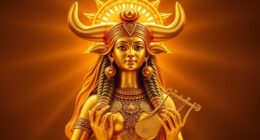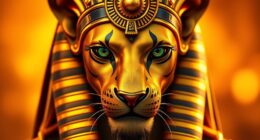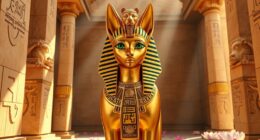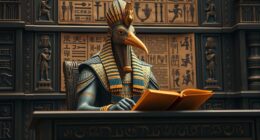The Star of David and the Tree of Life connect deeply through their symbolic themes of unity, divine protection, and spiritual growth. The Star represents harmony and the merging of opposites, while the Tree illustrates divine emanations and the path of spiritual ascent. Together, they embody interconnectedness, divine energy, and the journey toward enlightenment. Exploring these symbols reveals how they complement each other in expressing faith, resilience, and universal harmony—there’s much more to uncover if you continue to explore.
Key Takeaways
- Both symbols represent divine protection, harmony, and interconnectedness within Jewish spiritual and cultural traditions.
- The Star of David embodies the union of opposites, while the Tree of Life maps divine emanations and spiritual ascent.
- Kabbalistic meanings link the two, emphasizing balance, divine energy flow, and unity of spiritual and material realms.
- The Star of David visually symbolizes interconnectedness, echoing the Tree of Life’s depiction of divine emanations and cosmic structure.
- Both serve as symbols of resilience, faith, and spiritual growth within Jewish heritage and mystical understanding.
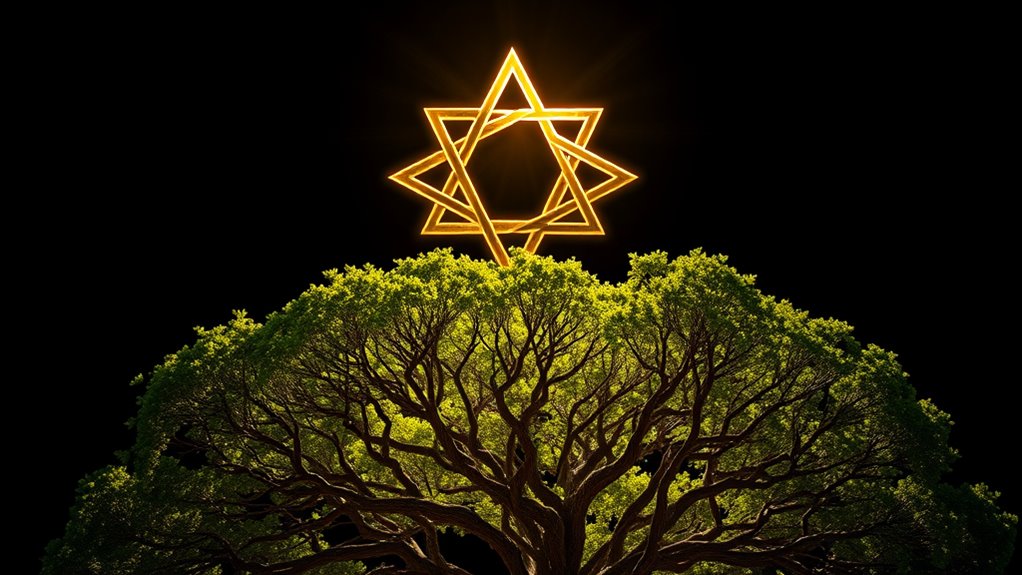
Have you ever wondered how symbols like the Star of David and the Tree of Life represent deeper spiritual meanings? These symbols go beyond their surface appearances, embodying complex ideas rooted in history, mysticism, and cultural identity. When you explore their Kabbalistic meanings, you’ll find a rich tapestry of spiritual concepts that reveal the universe’s hidden truths. The Star of David, known as the Magen David, isn’t just a geometric shape; it’s a symbol of divine protection and harmony. Its two interlocking triangles symbolize the union of opposites—such as heaven and earth, spiritual and physical spheres—highlighting how balance and integration are central to spiritual growth. In Kabbalistic thought, this star represents the interconnectedness of all aspects of creation, emphasizing that divine energy flows through every part of existence. Culturally, the Star of David holds profound significance for Jewish identity, acting as a symbol of resilience and faith through centuries of adversity. Its presence on synagogues, flags, and religious artifacts underscores its role as a unifying emblem that connects individuals to their heritage and spiritual path.
Similarly, the Tree of Life isn’t just a decorative motif; it’s a profound symbol with layered meanings. In Kabbalah, it represents the structure of divine emanations—called Sephirot—that organize creation and spiritual ascent. Each Sephirah embodies different qualities, like wisdom, understanding, mercy, and strength, guiding you through the process of spiritual development. The Tree of Life illustrates how divine energy flows from the highest, most abstract levels of existence down to the material world, showing a pathway for soul’s journey and enlightenment. Its branches and roots symbolize the interconnectedness of all life, reminding you that everything is part of a larger, divine plan. Additionally, it serves as a cosmic map, illustrating the relationship between the divine and the earthly realms. Culturally, the Tree of Life appears in many traditions, symbolizing growth, renewal, and interconnectedness. In Jewish mysticism, it’s a blueprint of the universe and a map for spiritual understanding, helping practitioners connect with divine wisdom and navigate their spiritual journey.
Both symbols serve as visual representations of complex spiritual truths, resonating deeply within their respective cultures. Their meanings extend beyond simple shapes, inviting you to explore the divine facets of existence, balance, and interconnectedness. As you learn about their Kabbalistic and cultural significance, you’ll see how these symbols continue to inspire and unify people across generations, embodying universal themes of spiritual growth, protection, and understanding. They remind you that symbols aren’t just decorative—they’re gateways to deeper insight and connection with the divine.
Frequently Asked Questions
How Do Different Cultures Interpret These Symbols?
You’ll find that different cultures interpret these symbols through the lens of interfaith symbolism and artistic representations. The Star of David often signifies Jewish identity, while the Tree of Life appears in many traditions, symbolizing growth and interconnectedness. These symbols are woven into cultural art, religious practices, and spiritual beliefs, allowing diverse communities to connect and communicate shared values across faiths and histories.
Are There Variations of These Symbols Across Religions?
Yes, these symbols vary across religions through symbolic geometry and artistic representations. You’ll see different interpretations that reflect each faith’s values and history, such as variations in design, color, and context. Some religions emphasize specific geometric features to convey spiritual meanings, while artistic representations adapt these symbols to cultural styles. These differences help you understand how each tradition uniquely expresses universal themes like faith, unity, and divine connection.
What Historical Origins Connect These Symbols?
You discover that the historical symbolism behind these symbols traces back thousands of years, rooted in ancient cultures and spiritual traditions. The Star of David’s origins connect to Jewish identity and divine protection, while the Tree of Life embodies growth, interconnectedness, and eternal life in various cultures. These symbols’ cultural interpretations reveal deep meanings, reflecting humanity’s universal desire for connection, hope, and understanding, transcending time and religious boundaries.
How Are These Symbols Used in Modern Practices?
You use the Star of David and Tree of Life in modern practices to symbolize spiritual connection and protection. The Star of David appears in Jewish rituals, representing divine protection and identity, while the Tree of Life symbolizes growth, interconnectedness, and eternal life in various cultures. You incorporate these symbols into jewelry, meditation, and rituals to deepen spiritual awareness, express cultural identity, and invoke their powerful symbolic meanings in everyday life.
Do These Symbols Have Personal Spiritual Significance?
Like a key revealing hidden chambers, these symbols hold deep personal meaning and spiritual significance for you. They serve as powerful reminders of your beliefs, heritage, and connection to something greater. When you see or use the Star of David or Tree of Life, you feel a sense of identity and purpose. These symbols become personal anchors, guiding your spiritual journey and enriching your understanding of life’s deeper truths.
Conclusion
By exploring the symbolic links between the Star of David and the Tree of Life, you see how ancient symbols convey deep spiritual truths. Some scholars suggest these symbols represent interconnectedness and divine wisdom, highlighting their shared purpose across cultures. While interpretations vary, it’s clear that understanding these symbols enriches your perspective on spiritual unity. Embracing these connections reminds you that symbols can serve as powerful bridges between different traditions and beliefs.

